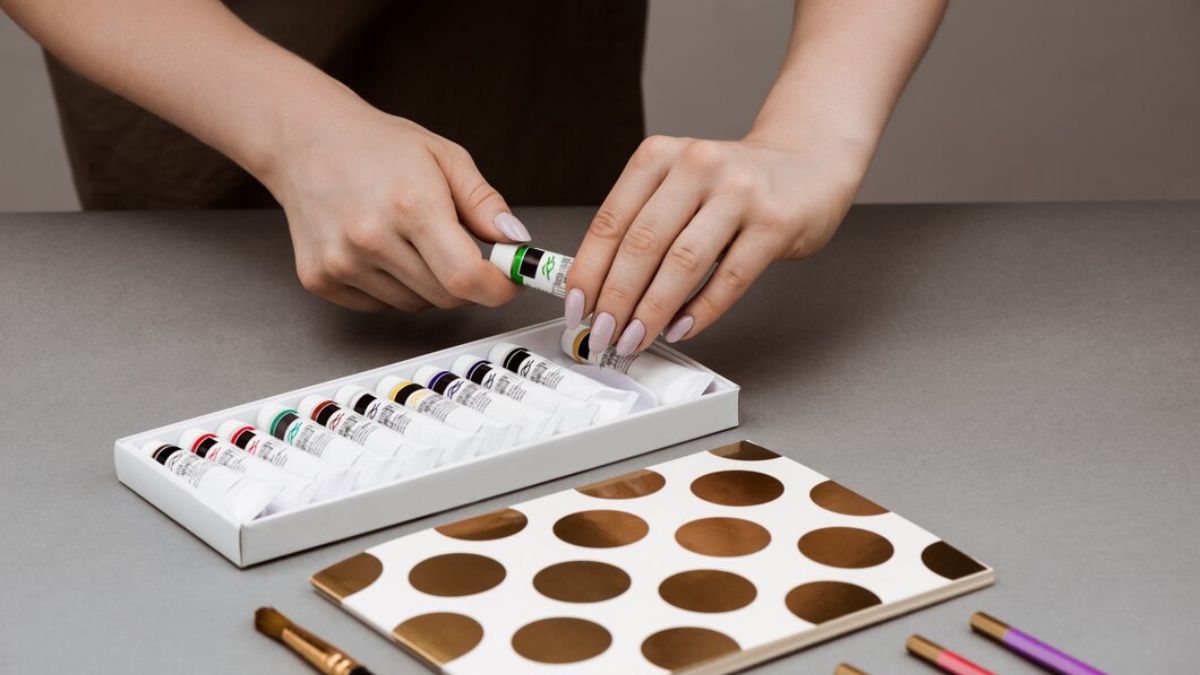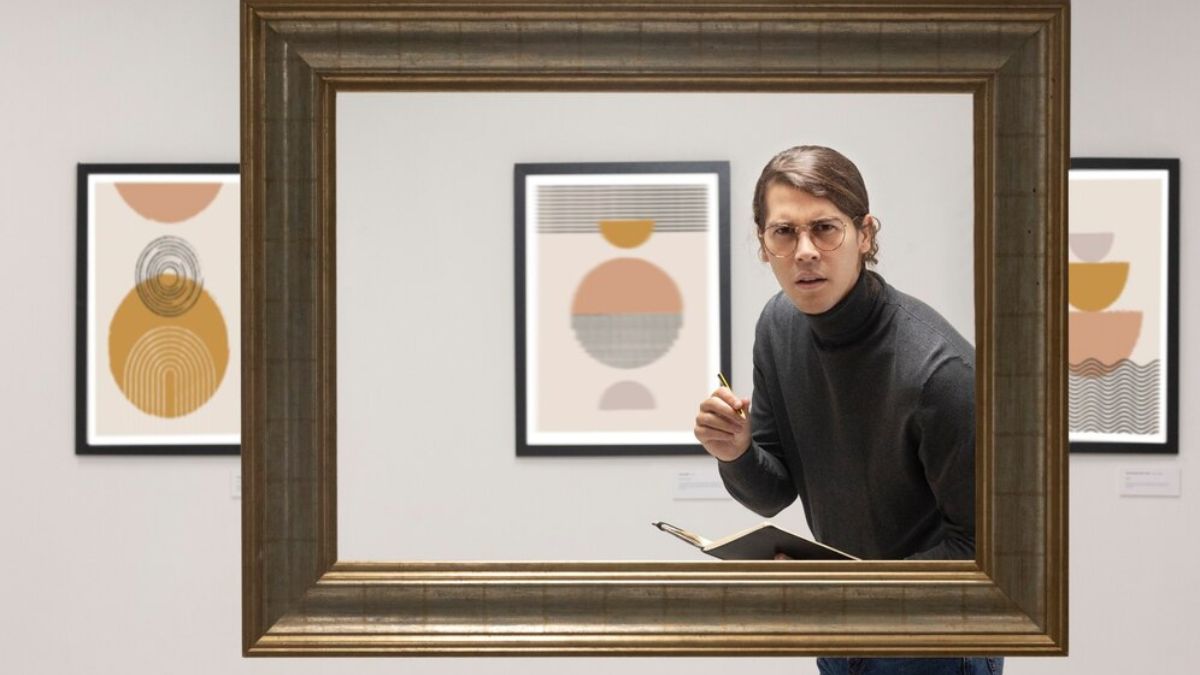ART
Your Ultimate Guide to Micro Art in Nail Design

When it comes to nail trends, “micro art” is making waves as the go-to for fashion-forward beauty enthusiasts. From tiny brushstrokes to intricate miniatures, micro art on nails isn’t just a trend—it’s a whole new world of creativity and self-expression. It’s perfect for anyone wanting to add a personal, artistic touch to their style in a way that’s subtle, yet statement-making. Why just wear art when you can carry it at your fingertips?
Curious to know more about this dazzling trend? Read on to discover what micro art is, why it’s stealing the show, and how you can create your very own micro arp-worthy (art + sharp) manicure at home or in the salon!
What Is Micro Art for Nails?
Micro art is exactly what it sounds like—tiny, detailed designs painted directly onto your nails. Think delicate floral motifs, miniature galaxies, fine geometric patterns, or even fun, small-scale replicas of your favorite emojis. What makes it so special? It’s like creating a one-of-a-kind painting but on a mini canvas—your nails!
The beauty of micro art is its versatility. It works on short nails, long acrylics, or even gel polish applications. Whether you prefer minimalist sophistication or bold and colorful designs, the options are endless.
With micro art, your nails become a conversation starter. Who wouldn’t want to hear compliments on their tiny nail masterpiece?
Why Is Micro Art a Game-Changer?
- Precision Unleashed
Micro art pushes the boundaries of traditional nail art by focusing on precision and intricate details that wow at first glance. It’s like giving your manicure a designer upgrade!
- Personalized Style
Micro art lets you express your unique interests or aesthetic, whether it’s tiny stars for the dreamer in you or miniature daisies for a fresh spring vibe. The possibilities are infinite!
- Universally Appealing
It plays well with all styles—minimalists love its understated beauty, while maximalists can go all-in with multiple designs on each nail.
But Wait—What’s the Buzz About “Micro Arp”?
Nope, it’s not a typo. “Micro Arp” (short for micro art + sharp nails) is the edgier cousin of micro art. It pairs stunning miniature nail designs with bold, sharply shaped nails—think almond, stiletto, or coffin shapes. The result? A unique blend of boldness and intricate detailing for nails that truly stand out.
Imagine this fun twist next time you’re brainstorming your next Instagram-worthy manicure.
The Supplies You’ll Need to Create Micro Art Nails
Here’s the great news—whether you’re a seasoned nail pro or an at-home DIY artist, creating micro art doesn’t require an art degree. Here’s what you’ll need:
- A Fine Detailing Nail Brush
For micro art, investing in a high-quality, ultra-thin brush is a must. Precision is key, and this tool will help you master those delicate lines and tiny designs.
- A Selection of Nail Polishes or Nail Gel Colors
Pick a variety of colors, from neutral shades to vibrant hues, depending on your design goals. Gel formulas work great due to their forgiving application and longer drying times.
- Dotting Tools
For perfect circles, polka dots, or eyes on characters, dotting tools make detailing swift and easy. Pro tip—use different-sized dotters for variety.
- A Steady Hand or Nail Decal Stickers
If freehand artistry isn’t your strong suit, don’t fret! Nail decals and stickers can add an equally creative flair to your design without the stress of painting manually.
- Top Coat
Sealing your micro art with a top coat protects it from smudges and gives it a shiny, long-lasting finish. Glossy or matte? The choice is yours!
- Nail Art Mini Accessories (Optional)
Want to level up your micro design? Consider adding tiny rhinestones, beads, or foil for an extra pop of dimension.
Now that we’ve got our tools in hand, let’s move on to creating your masterpiece.
Easy Designs to Try at Home
Start exploring micro art with these beginner-friendly ideas:
1. Mini Florals
Paint tiny daisies, roses, or sunflowers on a neutral or pastel base. Add thin green strokes for stems or leaves to create a garden-fresh look.
2. Abstract Geometrics
Use contrasting colors like black and white or gold and navy to draw slim triangles, lines, and dots. Keep it mostly minimal for an artsy-chic vibe.
3. Mini Constellations
Create tiny stars, planets, and connecting lines on a dark, galaxy-inspired background. Perfect for star-gazers who want to match their horoscope mood!
4. Emoji Accents
What’s more fun than painting a little smiley face or heart eyes emoji on your nails? Pick your favorite!
5. Polka Dot Parade
Layer little clusters of polka dots in varying colors for a playful design that’s almost too cute to handle.
Feeling adventurous? Experiment by combining two or more of these designs across different nails for a mix-and-match nail art masterpiece.
Tips for Nail Art Success
- Practice Makes Perfect: Don’t stress if your first few attempts aren’t gallery-worthy. The more you try, the steadier your hand will be!
- Work Slowly: Micro art is all about tiny, precise strokes. Rushing will only lead to smudging, so take your time.
- Use a Magnifier: If extra precision is required, a small magnifying glass can work wonders for detailing.
- Layer Up: Thin layers of polish or gel allow for more controlled detailing and less risk of smudging.
Remember—there’s beauty in imperfection, and your micro art tells your story.
Why Nail Art Is All About You
Fashion nails—including micro art—are more than just a beauty trend. They’re an extension of your personality and creativity. With each tiny design you craft, you’re creating a one-of-a-kind statement. And the best part? There’s no right or wrong way to do it.
Whether you’re showing off micro florals on short nails or edgy “micro arp” on stiletto tips, micro art is all about having fun, experimenting, and expressing yourself one tiny detail at a time.
Do you feel inspired to give this a try? Go for it! We can’t wait to see your creations. Be sure to share your masterpiece with us online using the hashtag #MyMicroArtNails.
Happy painting! 🎨✨
ART
What Exactly Is a Flat White? Your Guide to This Beloved Coffee

If you’ve walked into a café and been puzzled by the mention of “Flat White” on the menu, you’re not alone. Over the past decade, the flat white has grown from its humble beginnings in Australia or New Zealand (we’ll cover this debate shortly) to becoming a global favorite in coffee shops from Sydney to Seattle. But what is it exactly, and why has it captured the hearts of coffee lovers everywhere?
This guide will walk you through everything you need to know about the flat white, from its origin story and key ingredients to how it compares with other espresso-based drinks. By the end, you’ll not only understand what makes this drink so special, but you might just find yourself craving one.
What Is a Flat White?
A flat white is a coffee beverage made with a shot of espresso topped with microfoam—a steamed milk froth characterized by its velvety texture. Unlike a latte or cappuccino, the white features a higher ratio of espresso to milk, making it bolder and stronger in flavor.
The balance achieved in the white distinguishes it. It’s not as heavy or milky as a latte, nor as foamy and airy as a cappuccino. Instead, it offers a creamy, textured milk that complements rather than overpowers the rich espresso base.
What Does Microfoam Mean?
Microfoam is finely steamed milk where the air bubbles are so tiny they’re nearly invisible, creating a smooth, glossy milk layer. This texture is essential to the flat white, as it blends seamlessly into the espresso, creating a silky consistency in every sip.
Where Did the Flat White Come From?
The origins of the flat white remain a contested topic between Australia and New Zealand—two nations known for their proud coffee cultures. Here’s a quick look at the two sides of the story:
- The Australian Claim: Australians argue that the flat white was first poured in Sydney in the 1980s. Legend has it, a café owner innovated the drink as a lighter version of the cappuccino for customers who preferred their coffee with less foam.
- The New Zealand Argument: Across the pond, Kiwis insist the white originated in Wellington, New Zealand, in the same decade. New Zealanders credit the drink to a barista’s mishap with steamed milk that turned into an accidental, game-changing recipe.
Regardless of its exact birthplace, there’s no denying that the flat white is now a beloved international icon, especially following Starbucks’ adoption of it in 2015, which introduced it to an even wider audience.
How Does a Flat White Compare to Other Coffee Drinks?
If you find yourself often confused between coffee menu staples, you’re not alone. The lines between lattes, cappuccinos, and flat whites can be blurry if you’re not familiar with the specifics. Here’s a simple breakdown of how a white contrasts with others so you know whether it’s the right pick for your taste.
Flat White vs. Latte
- A latte typically has more steamed milk with a thinner foam layer compared to a flat white.
- The white uses microfoam exclusively, which makes it creamier but ensures a more pronounced espresso flavor.
- Lattes often come in larger sizes, while whites are typically served in smaller portions to preserve the espresso’s strength.
Flat White vs. Cappuccino
- The cappuccino has three distinct layers—espresso, steamed milk, and thick, airy foam on top.
- By contrast, in a flat white, the milk and espresso are fully integrated, with no thick foam separation.
- Cappuccinos are frothier and may have a stronger milk-to-coffee contrast, whereas whites feel smoother and less foamy.
Flat White vs. Macchiato
- While a macchiato is simply espresso “marked” with a small dollop of foam, a white is more balanced with its velvety milk texture.
- Macchiatos are much smaller and more intense compared to the flat creaminess.
Understanding these differences helps highlight why flat stand out as a refined and balanced option for espresso enthusiasts who enjoy milk in their coffee but want to taste the flavor of the espresso.
Why Has the Flat White Gained Such Popularity?
1. Perfect Balance
The flat white offers the best of both worlds—espresso lovers appreciate the bold coffee flavor, while those who enjoy milk-based drinks relish the creamy microfoam. It’s an elegant middle ground that suits many tastes.
2. Coffee Culture Influence
The rise of third-wave coffee culture, which celebrates artisanal and high-quality coffee, has amplified interest in elevated beverages like the flat white. Its origins in coffee-savvy nations like Australia and New Zealand give it a unique backstory that resonates with coffee enthusiasts.
3. Consistent Texture
The microfoam used in flat offers a beautifully consistent texture that feels indulgent yet not overly heavy. It’s especially appealing for those who find cappuccinos too frothy or lattes too milky.
4. Customization
Flat whites are versatile—you can pair them with dairy alternatives like oat milk or almond milk without losing that signature creamy texture. The natural sweetness of plant-based milks, combined with espresso, creates flavor combinations worth trying.
How to Make a Flat White at Home
Craving a flat white but not ready to head out to your local coffee shop? Here’s a simple step-by-step guide to enjoying this café favorite at home.
What You’ll Need:
- Freshly ground coffee beans
- An espresso machine
- Milk (dairy or plant-based). Oat milk works particularly well.
- A milk frother or steam wand
Steps:
- Prepare the Espresso
Brew a double shot of espresso for a robust coffee base; use high-quality beans for the best flavor results.
- Steam the Milk
Heat and froth your milk to create microfoam. Aim for a glossy texture with tiny, almost invisible bubbles. If you’re using a milk frother, swirl the milk in a circular motion to achieve that smooth consistency.
- Combine the Espresso and Milk
Pour the steamed milk directly over the espresso, ensuring it blends seamlessly. The milk should integrate into the coffee without creating thick foam layers.
- Enjoy!
Take a moment to appreciate the perfect blend and balance of espresso and velvety milk.
Pro Tip: If you’re feeling adventurous, top your flat with latte art. A simple heart design can elevate your coffee to true café quality.
The Flat White Is Here to Stay
The flat white isn’t just another coffee drink—it’s an experience. Its perfect balance, velvety texture, and unique backstory make it a favorite among coffee lovers worldwide. Whether you’re enjoying it in a café or perfecting your version at home, there’s no denying that the white is a timeless classic that will continue to delight taste buds.
Next time you’re browsing a coffee menu, why not give the white a try? Its rich, creamy flavor might just convince you why it’s one of the most celebrated coffee drinks out there.
ART
Unlocking the World of Rivenis.net, Where Creativity Meets Insight

Introduction
Creativity thrives when fueled by inspiration and knowledge. If you’re passionate about art, design, and exploring the evolving world of creative expression, Rivenis.net is your perfect gateway. From insightful tips on art techniques to decoding the latest design trends, Rivenis.net caters to aspiring artists, seasoned creators, and design enthusiasts alike.
This blog will explore the features of Rivenis.net, focusing on the variety of content it offers and how users can benefit from the platform’s resources. Whether you’re eager to refine your skills, stay updated with global trends, or elevate your artistry, this comprehensive guide will show you why Rivenis.net is the ultimate hub for creative minds.
What Makes Rivenis.net Unique?
1. A Deep Focus on Art and Design
Rivenis.net serves as more than just a platform—it’s a community for individuals devoted to art and design. Content is carefully curated to include step-by-step guides, tutorials, and educational resources, enabling readers to master both the fundamentals and advanced skills.
- Art Techniques
Learn to perfect your craft with professional how-to guides. From sketching basics to advanced painting practices, these resources cater to a wide range of skill levels.
- Art Trends
Explore the latest global trends. Whether it’s AI-assisted artwork or evolving eco-conscious movements, Rivenis keeps you ahead of the curve in contemporary creativity.
- Design Secrets
Get hands-on advice straight from industry experts. Discover insider tricks around color theory, minimalist styles, or crafting sustainable and impactful visuals.
2. Tailored for Diverse Creative Needs
Whether you’re creating your first artwork or refining your professional design portfolio, Rivenis.net provides relevant materials for every stage of the creative process. Content spans across industries and styles to ensure there’s something for everyone.
3. Immersive Learning Experience with Tasting Notes
Reader testimonials widely acclaim Rivenis’ unique ability to break down complex artistic and design techniques into approachable and actionable insights. With structured tutorials and practical examples, it’s never been easier to develop or expand your creative muscle.
Dive Into Key Content Areas
Art Techniques
Looking to improve your pencil sketches? Or perhaps you’re transitioning from traditional art forms to digital painting? Rivenis.net offers step-by-step tutorials and articles to help receptive creators enhance their techniques.
Examples include:
- Detailed walkthroughs on mastering watercolor gradients
- Fine-tuning lines and shading within pencil sketches
- How to transition from acrylic to oil painting
These resources make complicated processes manageable for readers at any stage of their artistic journeys.
Art Trends
Creative industries are dynamic, constantly shaped by cultural, technological, and societal shifts. Rivenis.net’s trend section allows you to stay informed.
Trends currently shaping 2024 include:
- The rapid ascent of digital hybrid art combining illustration with AI tools.
- The rise of sustainability-focused designs, particularly eco-friendly installations and technologies in art.
- A shift back towards bold abstract painting, signaling nostalgia-inspired retrospectives.
Rivenis doesn’t stop at trend reporting; it dives deeper into why these movements resonate with today’s audiences and how creators can capitalize on them.
Design Secrets
For creatives focused on aesthetics and functionality, Rivenis offers exclusive insight into transforming ideas into captivating designs.
Key features of this section:
- Advice on mastering color palettes for visual storytelling, with real-world examples from branding experts.
- Techniques to incorporate sustainability and minimalist design principles without compromising aesthetic appeal.
- Tutorials that guide users through crafting intuitive user interfaces (UI) or memorable branding identities.
Why You Should Use Rivenis.net
1. Broaden Your Horizons
Rivenis opens doors to new ideas and inspiration. Every article aims to expand your creative potential, encouraging readers to continuously innovate.
2. Learn From Industry Experts
The platform connects readers with professional designers and artists who share actionable strategies, making their wealth of experience accessible.
3. Stay Updated on Emerging Technologies
The creative field is increasingly tech-oriented—AI and digital tools have become essential components. With its tech-focused content, Rivenis ensures you’ll always stay ahead of the curve.
4. Join a Creative Community
The testimonials featured on Rivenis underscore the sense of community that drives the platform. Readers don’t just consume content; they actively become part of a larger creative movement.
How to Get Started with Rivenis.net
Navigating Rivenis.net is straightforward and rewarding. Here’s how you can start benefiting today:
- Browse through their main categories—Art Techniques, Art Trends, and Design Secrets.
- Bookmark tutorials or trend guides that align with your interests.
- Apply the tips learned to your current projects.
- Reach out with questions or share your creative thoughts—the Rivenis team loves connecting with its audience.
Final Thoughts
Crafting art and design isn’t just about tools; it’s about exploration, growth, and connection. With a treasure trove of educational resources, insider tips, and inspiration, Rivenis.net empowers creators to fulfill any artistic vision.
If you’re ready to elevate your artistry, refine your techniques, and tap into a thriving creative network, visit Rivenis.net and let your creativity flourish.
ART
The Ultimate Guide to Choosing an 11 x 14 Frame for Your Space

When it comes to displaying your cherished memories or favorite artwork, selecting the right frame is just as important as the picture itself. Among the many options, the 11 x 14 frame is a versatile size that fits beautifully in countless settings, from home decor to larger gallery walls. But how do you pick the perfect frame for your space and ensure it complements your photo or artwork?
This guide will walk you through everything you need to know about 11 x 14 frames—when to use them, different styles to consider, and tips for pairing them with your decor. No matter if you’re framing photos, prints, or posters, we’ve got you covered.
Why Choose an 11 x 14 Frame?
An 11 x 14 frame is the ideal balance between small and large formats. It’s big enough to showcase details in artwork or photos, yet it doesn’t overwhelm a space like oversized frames sometimes can. Here are some reasons why an 11 x 14 frame might be the perfect fit for your needs:
- Versatility: This size accommodates a variety of photo dimensions, making it suitable for art pieces or printed photos.
- Perfect for Matte Borders: 11 x 14 frames pair exceptionally well with matted borders for smaller artwork, such as 8 x 10 photos. It gives the display a professional, polished look.
- Works Well in Galleries: This size is ideal for creating a gallery wall. It’s big enough to stand out but not too large to dominate.
If you’re unsure of where to start your framing process, the 11 x 14 provides a reliable size that adapts to multiple settings and design styles.
Things to Consider Before Choosing an 11 x 14 Frame
1. Color and Material
Your frame’s color and material can enhance or detract from your image, so choose wisely! Think about where the frame will be displayed and pair it with a material that suits the surroundings. Some options include:
- Wood for a warm, classic feel.
- Metal for a sleek and modern appearance.
- Plastic for a lightweight, affordable option.
Colors can play an equally important role. Neutral tones like black, white, and gray work well for almost any photo or print, while gold or silver frames add an element of luxury.
2. Matting Options
Matting refers to the border added inside the frame around your artwork. Not only does it protect your photo or artwork by preventing contact with the glass, but it can also give your piece a more professional appearance. When using an 11 x 14 frame, consider matting if your print or photo is smaller (e.g., 8 x 10).
Matting can also affect the overall aesthetic:
- Single Mats have clean, simple edges that create an elegant look.
- Double Mats add extra depth with two layers of matting visible.
3. Orientation Matters
Decide whether you plan to hang your frame in portrait or landscape orientation. An 11 x 14 frame accommodates both easily, but thinking about the finished look can help you visualize how it fits into your design.
4. Glass Type
Glass or acrylic is used in frames to protect the photo or artwork. When selecting an 11 x 14 frame, consider these options for the glass:
- Standard Clear Glass for no-frills protection and clarity.
- Anti-Glare to reduce reflections, ideal in rooms with bright lighting.
- UV-Protective to preserve your photo or artwork over time.
Best Styles for 11 x 14 Frames
Whether your style leans toward modern minimalism or vintage charm, there’s an 11 x 14 frame that suits you. Here are some recommended frame styles and where to use them:
1. Classic Black or White Frames
Perfect for modern or minimalist designs, black and white frames provide a sleek and timeless look. They allow your photo or artwork to take center stage without distractions.
Best for:
- Black-and-white photography
- Abstract prints
- Professional certificates
2. Wooden Frames
Wooden frames exude warmth and character, making them a great choice for family photos or rustic-themed decor.
Best for:
- Portraits or vintage photographs
- Landscape artwork
- Farmhouse or traditional-style homes
3. Metal Frames
Metal frames bring a touch of sophistication and are particularly suited for contemporary pieces.
Best for:
- Bold, colorful art prints
- Award displays
- Industrial or modern interiors
4. Ornate Frames
Ornate and decorative, these frames are ideal for a glamorous or vintage aesthetic.
Best for:
- Classic oil paintings or reproductions
- Formal portraits
- Luxe interior designs
How to Use 11 x 14 Frames in Your Decor
Finding the perfect spot for your 11 x 14 frame can make all the difference. Here are some ways to integrate them seamlessly into your home or office design:
Gallery Wall
Create a gallery wall by combining several frames, including a mix of 11 x 14s and other sizes. Play with arrangements—try symmetrical patterns or eclectic layouts for a personalized touch.
Highlight a Focal Point
Use a single 11 x 14 frame to showcase a standout piece of art or a cherished photo on a blank wall. It works particularly well above a console table or fireplace.
Desk or Tabletop Display
If wall space is limited, stand your frame vertically or horizontally on a desk, bookshelf, or entryway table. Accessories like small plants or figurines can enhance the look.
Pro Tips for Hanging and Maintaining Your Frame
- Use proper hanging hardware or command strips for secure installations. Don’t rely on nails alone!
- Make sure the frame is level using a bubble level or smartphone app. Crooked frames can ruin the aesthetic.
- Keep your frames clean by wiping the glass regularly with a microfiber cloth.
Where to Buy 11 x 14 Frames
11 x 14 frames are widely available both in physical stores and online. Popular retailers include:
- IKEA for affordable, simple designs.
- Target for mid-range, trendy options.
- West Elm or Pottery Barn for high-end, premium styles.
- Amazon for a variety of choices delivered to your door.
No matter where you decide to purchase your frame, ensure it’s made with durable materials that can withstand the test of time.
Showcase Your Memories in Style
Choosing the right frame transforms your photo or artwork into a masterpiece. With its versatile size and endless design possibilities, an 11 x 14 frame is the perfect way to upgrade your decor. Pay attention to your style preferences—whether minimal, luxurious, or rustic—and ensure your choice elevates your display.
Whether you’re framing a vacation snapshot or the latest addition to your art collection, get creative and make it yours!
-

 BLOG10 months ago
BLOG10 months agoWho Is the Father of CSK? A Deep-Dive Into Chennai Super Kings’ Dominance in Cricket
-

 EDUCATION11 months ago
EDUCATION11 months agoHighlights From the September 18 Board of Education Meeting
-

 PLATFORM10 months ago
PLATFORM10 months agoThe Ultimate Guide to MyDesi.Net – Where Culture Meets Connection
-

 EDUCATION11 months ago
EDUCATION11 months agoA Look Back at the Board of Education City of Linden 2020 and Manganello’s Impact
-

 HOME IMPROVEMENT10 months ago
HOME IMPROVEMENT10 months agoHome Depot Tool Rental, Everything You Need to Know
-

 TECHNOLOGY11 months ago
TECHNOLOGY11 months agoUnderstanding Mega-Personal.Net Technology and Its Applications
-

 BLOG9 months ago
BLOG9 months agoUnderstanding Missav: Everything You Need to Know
-

 TRAVEL10 months ago
TRAVEL10 months agoTravel Smarter with TravelsForNow, Your Guide to Exploring the World
